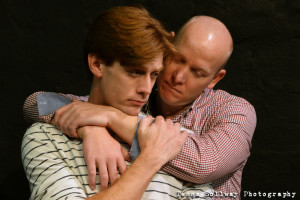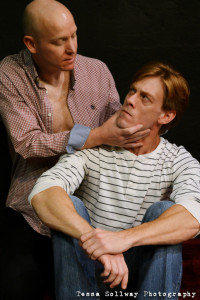Gay. Straight. They’re just words, aren’t they? Why should it matter what you sleep with, shouldn’t the focus be on with whom you sleep? In a riveting and provocative production of Mike Bartlett’s Cock, the Fells Point Corner Theatre begs the question of sexual persuasion and its correlation to identity. Primed to spark a discussion, this engaging and somewhat shocking drama Directed by Steve Goldklang delivers high-octane intense scenes of emotional turmoil, drastic moments of brilliantly written arguments, and shocking realities of truth when it comes to making life changing decisions. Riveting, clever on a level that darkly tickles the soul, and ultimately evocative to a fault, this stunning work may yet be the finest to cross the FPCT stage in the 2015/2015 “Fire in the House” season.
Round I: Simplicity VS Complexity— The Aesthetic of the Show
While a show set in modern Britain with only four characters in a domestic situation, much of which occurs inside a singular apartment, presents a great deal of staging and scenic opportunities, Scenic Designer Roy Steinman takes a blunt and simplistic approach to knocking out the set. Dingy white walls splattered with red, as if a literal cock fight had occurred in the arena of space just before the show started, and a red circle ring to focus the action are all the imagery Steinman provides to the audience, with the exception of two blood-thirsty, blood-red roosters posed in battle stance against the main back wall. This deceptively simple approach to the show’s aesthetic invites the imagination of the audience into the play while simultaneously allowing theatergoers to focus on the story that unfolds.
Steinman, working with Lighting Designer Stanley Kudzin and Sound Designer Andre J. Porter, conceptualizes the notion of an actual cock fight and threads this through the scene shifts. Kudzin brings sharply focused lights to the center of the ring and Porter provides the iconic bell which starts the scene to action once the contenders have been placed. This thematic reflection echoes throughout the text and is well-represented in the design elements of the production, including Porter’s use of pre-show sound, a compilation of ringside noises that easily places the audience in the mindset for a big match.
Winner: SIMPLICITY
Round II: Playwright & Director VS Play— Tag-Teaming the Importance of Words
Playwright Mike Bartlett has penned an exceptionally brilliant drama that closely examines the intricacies of dysfunctional relationships as focused through a lens of sexual identity. Bartlett’s word choice is exacting, crafting dialogue with a finely-honed expertise, particularly when it comes to the arguments constructed between characters. Bartlett’s command of natural flowing dialogue is sublime; the razor-sharp zingers that he layers into his character’s speeches— mainly M’s— are visceral and darkly witty. The play itself is written in such a way that draws the audience into the dysfunction of these characters and makes it difficult to side with any one of the three that are drawn into the main drama without first carefully considering the other two.

Director Steve Goldklang presents a well-seasoned hand on the helm when it comes to the navigation of the show. The action is on a steadily exponential build as the proverbial shit approaches the fan and Goldklang’s mastery of keeping the tensions that drive the action alive is praiseworthy. Carefully working over the barren play space, Goldklang blocking mimics the emotions of each of the character’s fights, even when it’s not overstated by the text. His ultimate approach to keeping consistency in the pacing is remarkable for even when the action of the play stalls with the introduction of the F character late in the show Goldklang keeps the audience enrapt with attention.
Winner: PLAYWRIGHT & DIRECTOR
Round III: Actors VS Characters— Emotional Crap that Orbits you like Space Junk
Only appearing late in the show, Thom Peters as ‘F’ brings a nasally whine to his character portrayal of the father and lays into this affectation heavily. Peters, like everyone in the production, does an exceptional job of maintaining consistency with his British accent. The accents on the whole have regional specificity but in a subtle fashion, and never falter even in moments of heightened emotional outburst. The word-heavy monologue Peters’ character delivers at the dinner table serves as an unfortunate wrench in the dramatic climb of action, stalling out the climactic build just before the big decision is made. Despite this mechanical vice, Peters handles the moment with present and mindful awareness and keeps the interest of the audience despite the way the words of that moment are structured.

M (Donald Charles) and F (Barbara Madison Hauck) are antagonizing catalysts if one approaches John (David Shoemaker) as the inactive protagonist of the story. All three performers share exceptional stage chemistry, whether it is in moments of connectivity or moments of bombastic argument. Charles has a firm grip on the eruptive intensity of his shouted deliveries, and while his volume seldom raises to the extreme the emotional intention is fully present in those moments of chaotic explosion, especially when going off the rails in John’s general direction. Charles finds balance in the character of M, keeping it from being a static portrayal of a jilted and frustrated lover, which plays into the pivotal question of with whom the audience places their sympathies and empathies.

Hauck, as a sensual, seductive, sasspot sex goddess, owns the character’s rich sexuality in both her verbal and physical execution of the character. Mimicking the stereotype of an overly emotional woman, her body language becomes an extension of her feelings; when she’s angry with John her physicality becomes closed off and guarded, when she’s pleased with him her body is open and receptive. Hauck firmly squares off with Charles late in the performance, the tension crafted between their exchanges ripened with acid ready to melt the scene into a chaotic disaster.

Shoemaker delivers a dynamic portrayal of a deceptively bland John. Seeming at first just indecisive and milquetoast, the character of John is exposed to be a deeply troubled individual. Shoemaker spends the better portion of the performance carefully crafting this unease and uncertainty so that when he erupts with a full-fledged emotional catharsis near the end of the production it is beyond shocking. His command of the character’s inconsistencies are both deliberate and poignant, which makes for a fascinating development as the play progresses. Grounded, present, and a mastery of silent facial responses, Shoemaker leads the audience through this emotionally destructive and dizzying tale of finding and expressing one’s true sexual identity.
Winner: ACTORS
The fight is over, the performance team the victor! And so too shall you be when you venture out to Fells Point Corner Theatre to enjoy this raw and unapologetic production of Cock.
Running Time: Approximately 100 minutes with no intermission
Cock plays through December 20, 2015 on the Main Stage at the Fells Point Corner Theatre— 251 S. Ann Street in historic Fells Point of Baltimore, MD. Tickets can be purchased at the door or in advance online.

